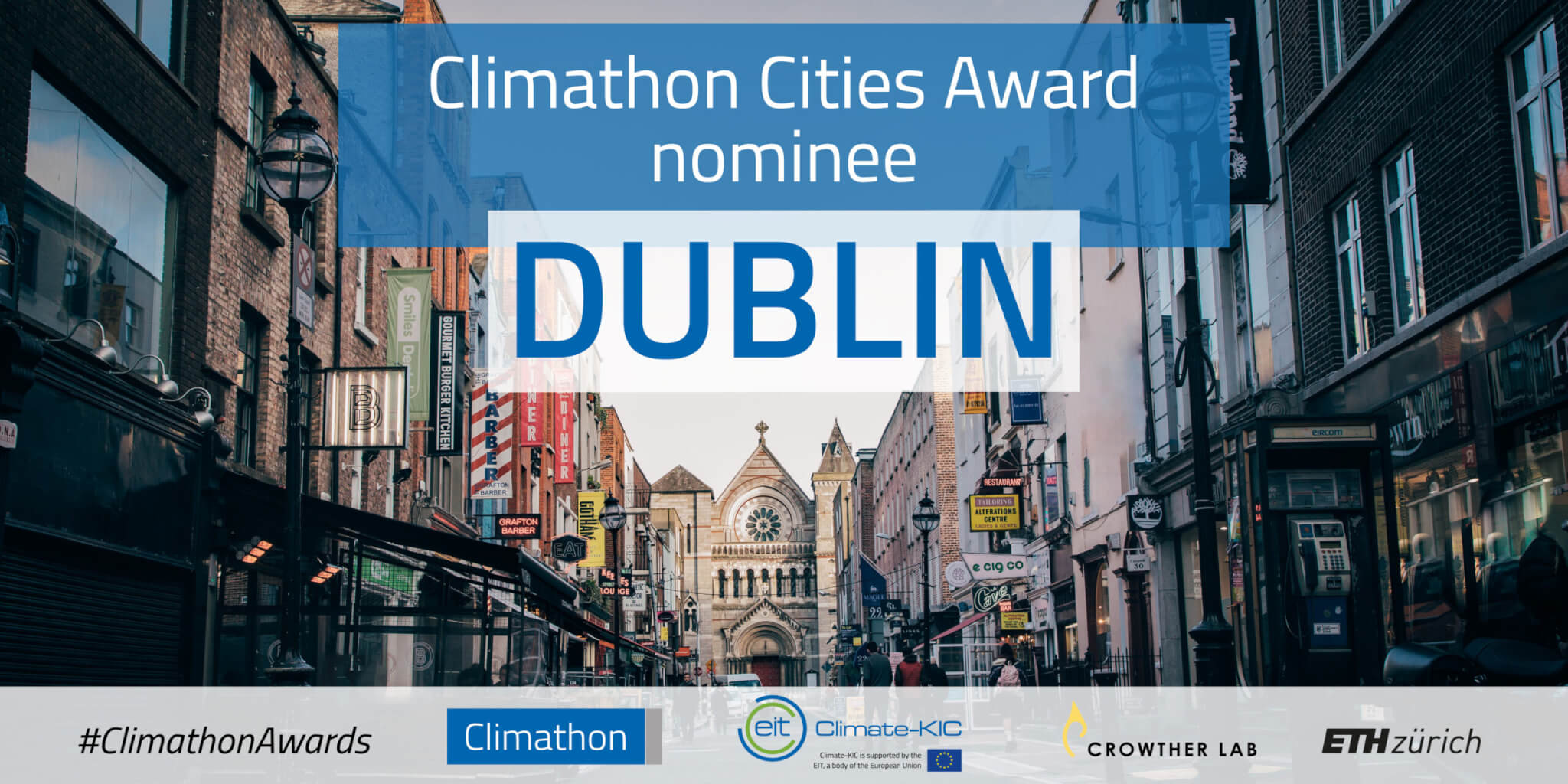
What motivated your city to participate in the inaugural Climathon Cities Award?
Dublin City Council engaged in the 2019 Climathon held by Trinity College Dublin. The council engaged with various stakeholders at the event which influenced the city in making an application around surface water management measures that are given in the city’s Climate Change Action Plan. The local Climathon organiser subsequently provided information and contacts to progress the application.
What is the biggest climate challenge your city faces?
The effects of climate change are already impacting Dublin City at a significant rate and are very likely to increase in their frequency and intensity. Dublin Bay’s average sea level appears to be rising faster than initially forecasted and has risen by twice the global average in the last 20 years. The number of extreme flooding events in the capital has risen in the last 10 years, as has the number of days with heavy rainfall. Dublin City has also experienced extreme temperatures, as witnessed recently in 2018, with Met Éireann issuing its first ever Status Red warning for snow in February, followed by one of the hottest summers on record during June and July. The biggest climate challenge facing the city is adapting and mitigating to these extreme weather events.
What role do cities play in climate action? What role can citizens play?
Cities play an active role in developing leadership through policy and actions guiding and inspiring citizens and stakeholders to take positive climate actions. Dublin City Council has developed an ambitious climate action plan to demonstrate the mitigation and adaptation actions it is taking in its role to address climate change. Key areas within this plan focus on engaging with citizens and stakeholders to encourage and empower them to also play their part in taking climate action.
Citizens are crucial for solutions to climate change. As such, Dublin City Council is setting out to actively inform and engage the public through a range of innovative programmes and partnerships and, where possible, facilitate bottom-up, community-led solutions.
What are the climate benefits of your project for your city and its citizens?
The main benefits for the city and citizens are environmental, social, economic, health and well-being. The primary benefit of our project, which will introduce appropriate natural water retention measures into as many public realm and communal areas as possible across the city, is a reduction in flood risk and a reduction in the pollution of watercourses (by treating the surface water and reducing spills from combined sewer overflows). The proposed project is also expected to deliver an improvement in air quality and a reduction in noise pollution. Improved management of surface water will also provide ancillary benefits in terms of health and safety, enhancing local biodiversity and a positive effect on community cohesion.
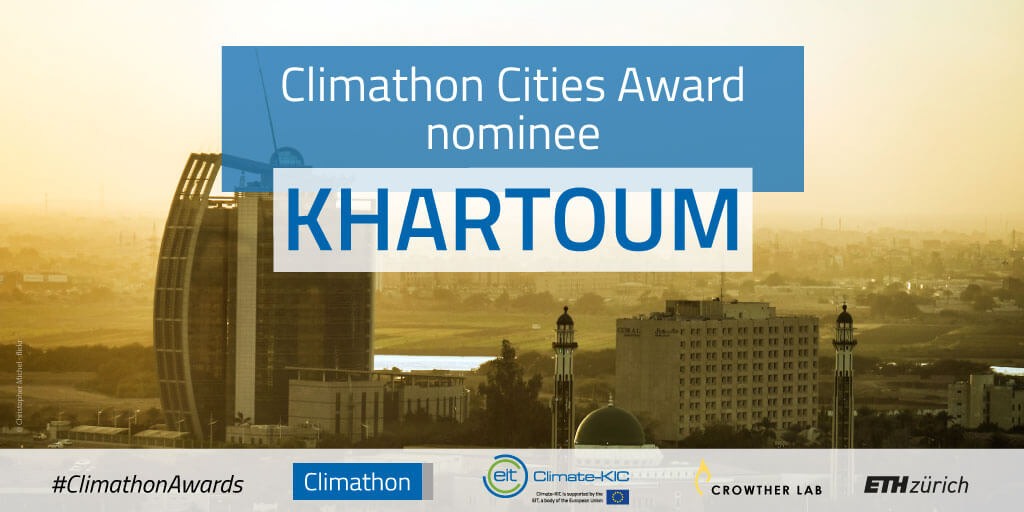
What motivated your city to participate in the inaugural Climathon Cities Award?
Climathon Khartoum, both in 2018 and 2019, has produced innovative solutions that tackle climate threats such as extreme flooding and drought. These successes motivated our city to participate in the inaugural Climathon Cities Award. Our city aims to promote the value of traditional local climate change knowledge, a rich source of knowledge that can contribute to environmental conservation and complement scientific knowledge. Each society might have their own traditional knowledge that has been transmitted from one generation to another. Hence, documenting such knowledge should be given priority as it reflects a complex process that incorporates aspects of culture, spirituality, identity and history.
What is the biggest climate challenge your city faces?
Khartoum is one of the most vulnerable states in Sudan to climate change. Severe weather such as extreme temperatures, drought, floods and dust storms are the main challenges that the city faces. Climate change also poses serious threats to local livelihoods; flash floods in 2013 and 2019 resulted in the death of over 100 people, thousands of houses were destroyed, and hundreds of livestock were killed. The vulnerability of Khartoum city to climate change is expected to increase.
What role do cities play in climate action? What role can citizens play?
Cities can play a vital role in climate action both in terms of mitigation and adaptation. They can embrace resilience policies, plans and regulations that promote green infrastructure and buildings, increase green spaces, and enforce sustainable urban planning measures. Cities could also promote energy efficiency initiatives and best practices, e.g. encouraging the use of renewable energy.
Citizens can take an active role in tackling climate change both individually and collectively. This could include, for example, adopting economic activities that do not undermine the sustainability of our environment, promoting the usage of clean energy and environmentally friendly transportation, and taking an active role in increasing green spaces and plantations. They can also undertake an important role in climate change advocacy by pushing governments and city authorities to adopt green plans and policies.
What are the climate benefits of your project for your city and its citizens?
The project will help provide a better understanding of climate change and adaptation from a local perspective. This local climate knowledge will help to lay out the foundations of climate models; integrated into adaptation and mitigation policies and plans. In addition, government and donor agencies will be able to create robust projects based on resilient local interventions. The project will scale up successful practices that have proven economic prosperity in other communities with similar contexts, as well as promoting local knowledge and practices that have had positive impacts on biodiversity and conservation.
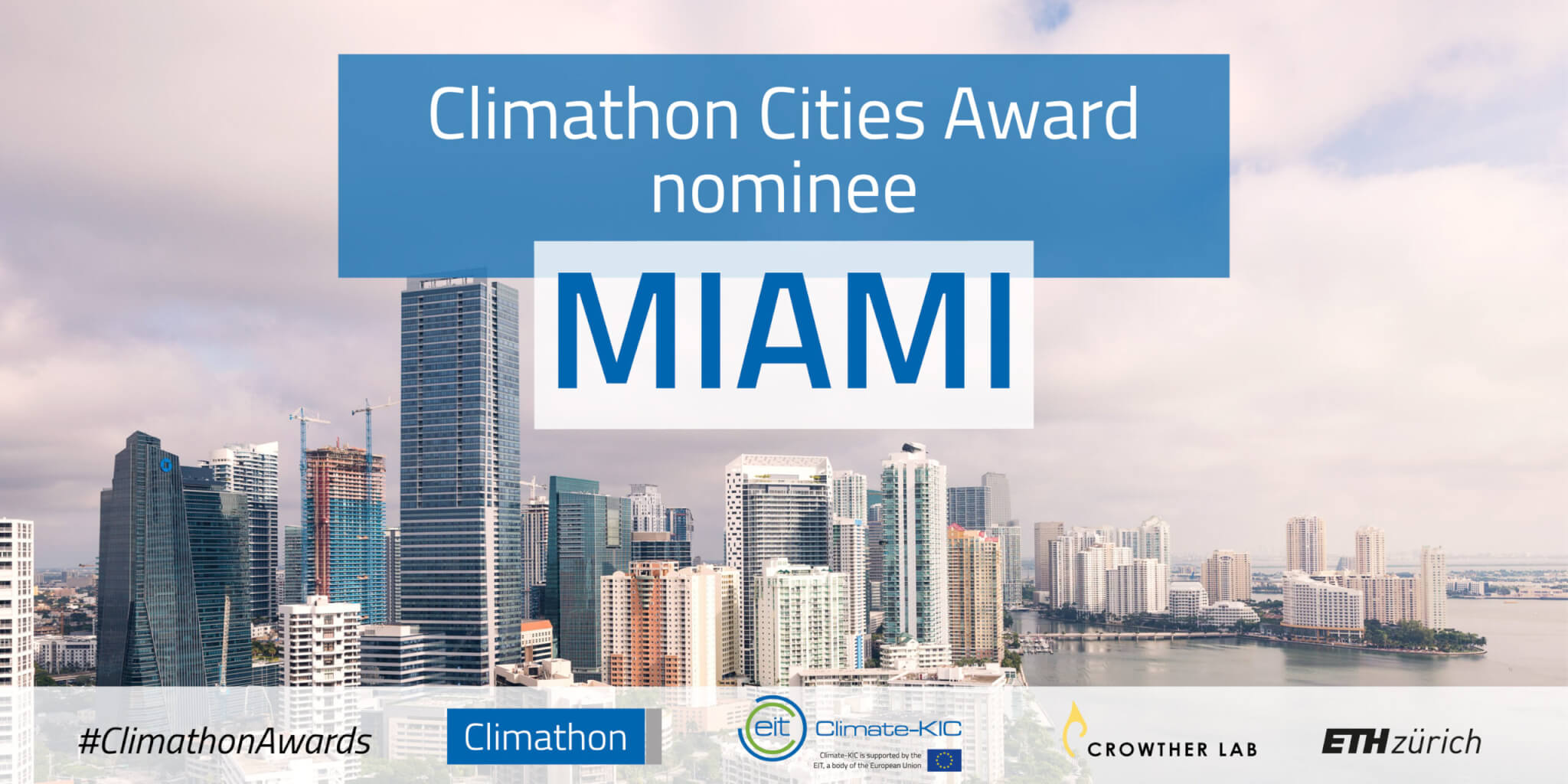
What motivated your city to participate in the inaugural Climathon Cities Award?
The City of Miami is taking bold steps to adapt to and mitigate climate change risks through robust planning, investing in resilient infrastructure, strengthening of land use and building policies, advancing new mobility solutions, and communications and outreach. The City sees the Climathon Cities Award as a unique platform to be able to highlight the ways in which Miami is addressing both the effects and causes of climate change. Further, the Climathon Cities Award is an opportunity for the City of Miami to share and exchange innovative solutions with the international community. Collaboration on multiple scales is integral to enhancing the city’s resilience for current and future challenges and conditions.
What is the biggest climate challenge your city faces?
Climate change has exacerbated natural hazards through increasing risks of flooding and storm surge, more intense storms, and extended periods of high heat. As a low-lying coastal city with an average elevation of 1.8m above average sea level, Miami is vulnerable to the effects of sea level rise. Because the Florida peninsula is comprised of a porous limestone bed, rising seas are pushing up groundwater levels. Hurricane intensity and rainfall are projected to increase as the climate continues to warm. Rising sea levels will lead to higher storm surge, warmer air will lead to more rainfall, and a warmer sea will lead to faster wind speeds – all of which can make hurricanes more powerful. Due to Miami’s high humidity, the number of days with an extreme or dangerous heat index, days where it feels over 90° F (32.2°C), are projected to grow and exceed any other city in the country by 2050.
What role do cities play in climate action? What role can citizens play?
Cities can and have been significant contributors to greenhouse gas emissions but are also uniquely positioned to turn the tide and be drivers of solutions. Through meaningful actions such as neighborhood planning, design guidelines, policies and infrastructure, cities can adapt to, and mitigate current and future climate risks. Citizens can advocate for the positive changes they want to see in their cities, generate innovative solutions and engage in behaviours that drive positive climate action. They can be vested, active participants of mitigation and adaption solutions and strategies. The individual actions of citizens can have powerful collective impact.
What are the climate benefits of your project for your city and its citizens?
Networked green infrastructure in the public right-of-way will address city-wide hazards of extreme heat, high winds and severe flooding. Plantings provide a canopy over porous-paved, fully accessible public space. Below the surface, the interconnected root zone of the plants operates as a living forest: capturing and releasing stormwater via evapotranspiration and interweaving to fortify trees against wind toppling. The project will also sequester blue carbon in the hydric soils of a subsurface wetland of an urban cypress dome, developed in accordance with the Blue Carbon Institute’s guidelines to maximize calculated carbon sequestration.
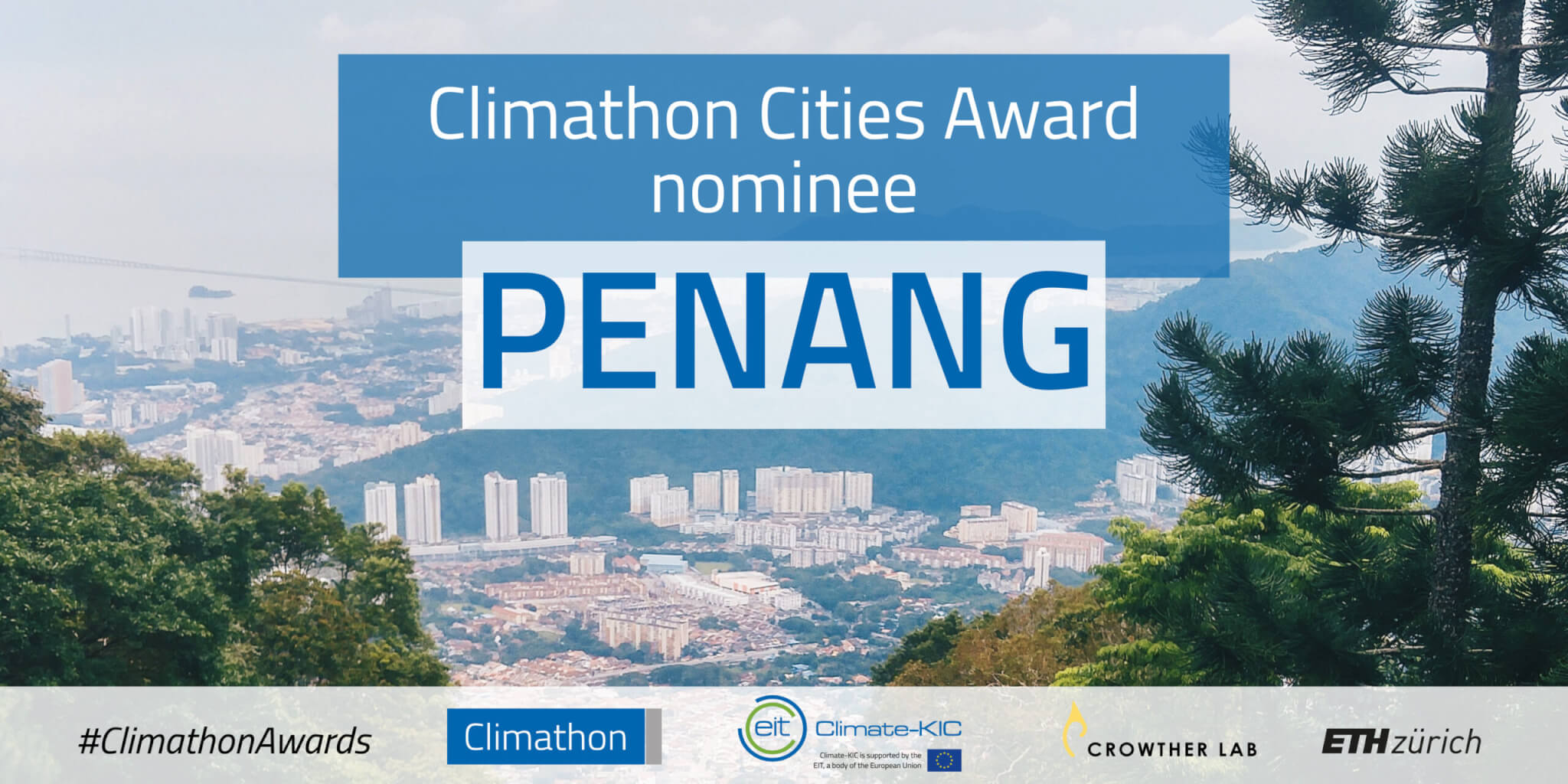
What motivated your city to participate in the inaugural Climathon Cities Award?
The Nature-Based Climate Adaptation Programme for the Urban Areas of Penang Island was initiated to address the severe climate impacts the city faces in the short term, which should be considered a priority in terms of action by both government and citizens. The Climathon Cities Award would help address the challenges by allowing us to join city networks to exchange knowledge about urban climate adaptation policies and tools. The Climathon Cities Award is an extraordinary platform which can help Penang in achieving these goals.
What is the biggest climate challenge your city faces?
Penang faces two main climate challenges: heat stress and flooding. The mean annual temperature of Malaysia is projected to rise by almost 4°C on average from 1990 to 2100. In Penang, the mean temperature has already increased by 1.5°C from 1951 to 2018. Studies predict that in 2050, Malaysia will experience 200 days with heatwaves per year, compared with 20 days in the 1980s. This will impact public health, particularly in the most vulnerable communities.
Besides the increase of extreme weather events leading to flooding, there has also been a 15% increase in the total volume of rainfall over the past 40 years. In November 2017, the heaviest rainfall registered in Penang’s history led to flooding, causing the loss of seven lives and more than 1 billion RM in damages. Increased rainfall combined with higher temperatures is also expected to increase cases of vector borne diseases such as dengue.
What role do cities play in climate action? What role can citizens play?
Cities are at the forefront of climate impacts due to a combination of concentrated populations and infrastructure. They also face specific impacts which may be more similar with foreign cities than with cities in the same country – in this sense they can be agents for transnational knowledge sharing, with great potential for generating synergies and motivating action.
Specific urban social dynamics also have great potential in terms of bringing communities together in order to generate change from within, as well as motivating politicians to act. The role of citizens is essential in initiating, participating in, supporting and sustaining such movements.
The Penang Climate Adaptation Programme acknowledges the importance of citizens in climate action by including a programme aiming to empower women and girls in decision-making, as well as a youth-focused urban agriculture programme.
What are the climate benefits of your project for your city and its citizens?
The main benefits of the programme for Penang and for Penangites are the improvement of the urban microclimate, the reduction of flooding events, impacts to public health and damages to property and infrastructure. The programme also aims to reduce vulnerability imbalances, having a community-focused approach which includes the most vulnerable communities in climate related decision-making processes. Thewomen and girls programme aims to reduce gender vulnerability by empowering women with tools to overcome gender-specific challenges and will also result in significant benefits for half of the population.
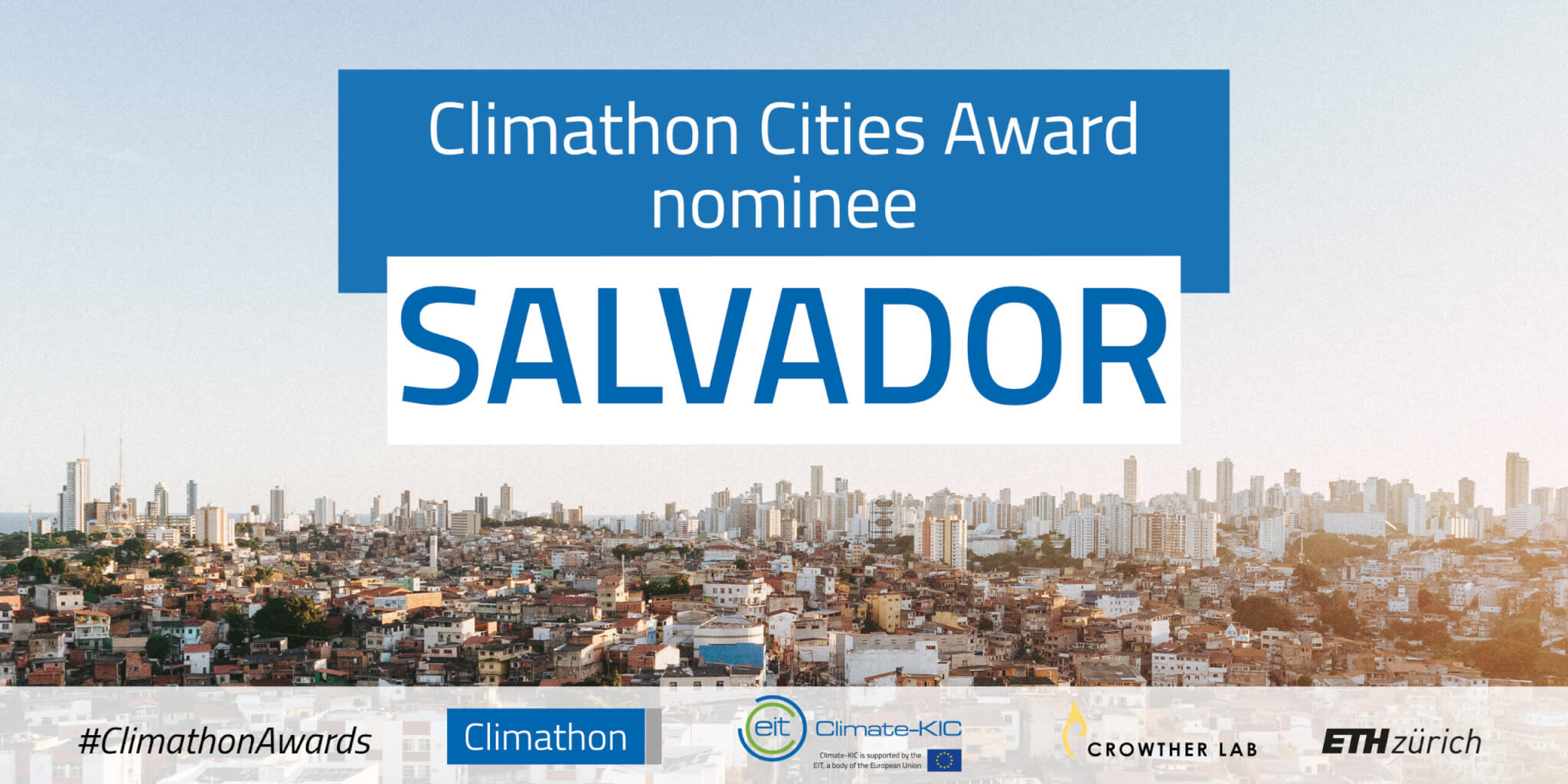
What motivated your city to participate in the inaugural Climathon Cities Award?
Salvador is constantly looking into awards and funding opportunities for its projects as a means of sharing information, increasing project visibility, gathering local and international support – as well as increasing funding opportunities for city projects.
What is the biggest climate challenge your city faces?
The biggest climate challenge the city faces is severe weather events such as extreme rainfall which leads to landslides and floods. Extreme weather events also increase social inequality within the city, which is the main challenge for a resilient Salvador.
Floods and landslides also tend to occur because of irregular waste disposal, this causes clogging of the drainage system and increases retention of water and, in the soil, facilitating soaking and increasing the risk of landslides.
What role do cities play in climate action? What role can citizens play?
Cities have a huge role in climate action as not only are they where a large percentage of citizen live, they are responsible for some of the main policies that can tackle greenhouse gas emissions and help to adapt to climate change. This includes transitioning to a low carbon transportation system, increasing pavement drainage to avoid flooding, encouraging sustainable housing construction and renewable energy.
Citizens are the enablers of change. They can change their lifestyle by opting for low carbon transportation (electric cars, bikes or public transportation), locally produced food and clothes. They can also install solar panels in their homes and demand politicians and companies to adopt sustainable technologies, in order to reduce greenhouse gas emissions, and to implement mitigation and adaptation policies.
What are the climate benefits of your project for your city and its citizens?
The main climate benefits of our project for Salvador and its citizens include the reduction of greenhouse gas emissions and extreme temperatures, plus an increase in green spaces.
